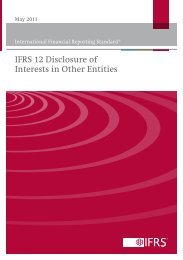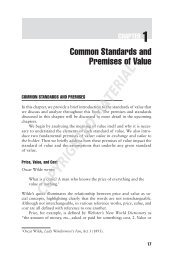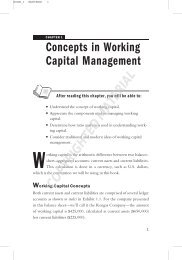ISSUE 5 2008 - Sweet & Maxwell
ISSUE 5 2008 - Sweet & Maxwell
ISSUE 5 2008 - Sweet & Maxwell
Create successful ePaper yourself
Turn your PDF publications into a flip-book with our unique Google optimized e-Paper software.
384 Case & Comment [<strong>2008</strong>]<br />
so as to give him an opportunity to deny, which he did, the language attributed<br />
to him, or not to offer him any other opportunity to show him their notebooks<br />
and invite him to adopt the same procedure. The justices were of the opinion<br />
that the appellant’s words, part of his alleged conduct in committing the offence,<br />
were caught by para.11.13 because, in the absence of an interview, he had had no<br />
opportunity at an early stage before trial to comment on the words attributed to<br />
him. They accordingly decided they should exclude the evidence as unfair under<br />
s.78. The prosecution offered no evidence and the justices dismissed the charge.<br />
The prosecution appealed by way of case stated. On appeal the prosecution argued<br />
that Pt 11 of Code C applied to statements not themselves constituting an offence<br />
or part of it, but made subsequently by a person suspected of it to a police officer<br />
on or during arrest, after arrest, en route to a police station or whilst in detention<br />
in police custody.<br />
Held, allowing the appeal, there was no basis as a matter of interpretation for<br />
extending para.11.13 of Code C beyond its confines of protecting a suspect against<br />
fabrication by a police officer of self-incriminatory statements after the alleged<br />
commission of the offence and not as part of it. The provisions of Code C Pt<br />
11, were not directed at what a suspect was alleged to have said as part of his<br />
conduct constituting the offence, but at what he was alleged to have said of a<br />
self-incriminatory nature on or after arrest for it. Otherwise, all offences of a public<br />
order nature in which words spoken were a necessary or possible constituent of the<br />
offence, in whole or in part, would engage Pt 11 of Code C, quite independently<br />
of and before any possibility of an interview, or ‘‘unsolicited comments outside an<br />
interview’’ could arise. Those offences would include the public order offences to<br />
be found in ss.1–5 of the 1986 Act, and those involving the stirring-up of racial<br />
hatred in ss.17–22 of the Act. In the instant case, the respondent had had the<br />
opportunity when charged to contradict what was alleged against him. He had seen<br />
the witness statements of the officers in good time before the hearing, and would<br />
have had an opportunity at trial to challenge their evidence if the justices had given<br />
him an opportunity to do so. The case would be remitted to the justices.<br />
[Reported by Dilys Tausz, Barrister]<br />
Talbir Singh for the claimant.<br />
R. de Mello and D. Bazini for the defendant.<br />
Commentary. As Auld L.J. notes, the purpose of Pt 11 of Code C is to<br />
militate against ‘‘verballing’’, the manufacture of self-incriminating statements and<br />
their attribution to an accused. This purpose is to be realised by the keeping of<br />
appropriate records of a suspect’s relevant actions and words. The significance of<br />
proper record-keeping is illustrated by a variety of decisions, including Keenan [1990]<br />
2 Q.B. 54, Canale [1990] Crim. L.R. 329, and Delaney (1988) 88 Cr. App. R. 338. In<br />
Keenan, Hodgson J. (at 69–70) suggested that where an appropriately serious breach<br />
of the Codes in relation to verballing took place, it would often be appropriate to<br />
exclude the evidence in question. He noted (at 70):<br />
‘‘If the rest of the evidence is strong, then it may make no difference to the<br />
eventual result if [the judge] excludes the evidence. In cases where the rest of the<br />
evidence is weak or non-existent, that is just the situation where the temptation<br />
to do what the provisions are aimed to prevent is greatest, and the protection of<br />
the rules is most needed.’’<br />
© SWEET &MAXWELL






